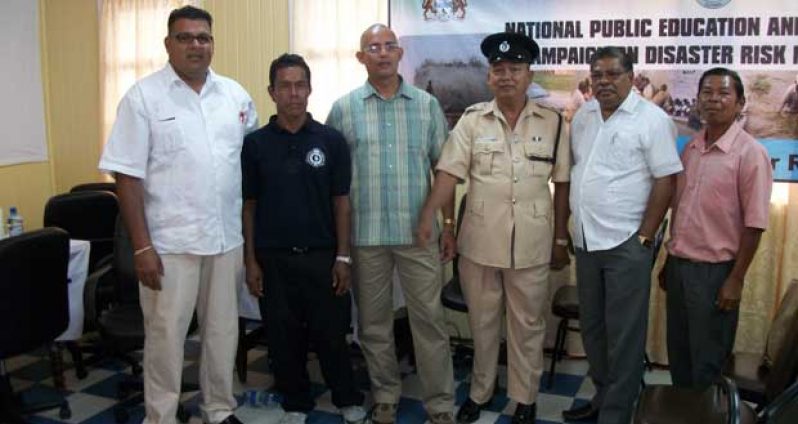THE Civil Defence Commission (CDC) last Thursday hosted it’s National Public Education and Information campaign on disaster risk management for Region Seven (Cuyuni-Mazaruni) in Bartica, the district’s seat of administration.
The exercise was held in the boardroom of the Region’s administrative building on First Avenue under the theme, ‘Guyana: Our Country, Our responsibility’. Among participating stakeholders from within the community were members of the ‘F1’ Division Community Policing Executive Committee.
CDC Deputy Director, Colonel Francis Abraham, introduced the programme’s agenda, and declared that the educational event is the exact premises of promoting on disaster risk management by utilizing proactive disaster risk management tools. He also said that the programme is aimed at reducing vulnerability to risks, and enhancing response mechanisms.
He used the 2005 floods as an example to serve as a wake- up call for many of us.
Project Coordinator of the Civil Defence Commission,( CDC), Mrs. Michelle Klass, also addressed those in attendance and declared that the object of the 2009-2013 Disaster Risk Management Plan is to support the Government of Guyana through designing and maintaining integrated disaster risk management programmes within the frame work of comprehensive disaster management.
She also said that the attained results of this 2009-2013 project are as follows: A draft Disaster Risk Management Bill, an integrated disaster management plan strategy, guidelines for agriculture and the environment, flood risk evaluation and care, community-based risk management programmes.
Two programmes were already piloted, one in the community of West Watooka in Linden, and the other in Albouystown, Georgetown. A National Public Education Campaign was also held where this event falls under. She then also said that the object of the campaign is to promote understanding in all Guyanese about the evident change in the weather pattern and it’s impact on the environment and how these relate to the international phenomenal of global warming and climate change.
CDC Director-General, Colonel (retired) Chabilall Ramsarup, in his presentation, declared that it is always nice to deal with any community group, because its members are the first to deal with any disaster in the first hour, which he termed “The Golden Hour “. Ramsarup also said that this presentation to Region Seven’s stakeholders is to basically educate all on disaster awareness, especially during “the golden hour”, when lives can be saved. He also said that disasters cannot be avoided, but their impacts can be reduced by structural means, meaning by keeping and maintaining our environment clean; and by none structural means, which is by engaging disaster reduction means.
This programme also embraces the projection plans of the National Community Policing Executives, (NCPE) for the coming year of activities that are already on the NCPE programme agenda for the forthcoming administrative year.




.png)









